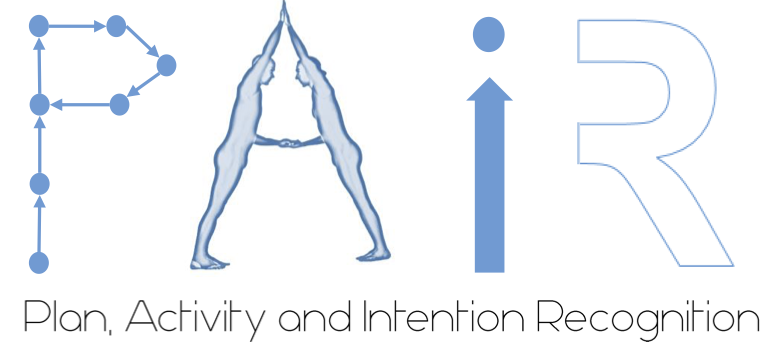Plan recognition, activity recognition, and intent recognition all involve making inferences about other actors from observations of their behavior, i.e., their interaction with the environment and with each other. The observed actors may be software agents, robots, or humans. This synergistic area of research combines and unifies techniques from user modeling, machine vision, intelligent user interfaces, human/computer interaction, autonomous and multi-agent systems, natural language understanding, and machine learning. It plays a crucial role in a wide variety of applications including: assistive technology, software assistants, computer and network security, behavior recognition, coordination in robots and software agents, and more.
This workshop seeks to bring together researchers and practitioners from diverse backgrounds, to share in ideas and recent results. It will aim to identify important research directions, opportunities for synthesis and unification of representations and algorithms for plan recognition. This year's workshop will be centered around the past and future of PAIR. This will include an introspection of previous approaches and a group discussion about possible future directions for the community.
Invited speaker: Shlomo Zilberstein
Plan recognition is an essential component of multiagent decision making. We examine plan recognition in this context and show that existing algorithms for multiagent planning can perform plan recognition implicitly. Furthermore, it is possible to cast specific variants of the plan recognition problem so that they can be tackled explicitly using existing POMDP, Dec-POMDP, or POSG algorithms. Doing so, we gain a precise definition of the objective of plan recognition in the context of a broader multiagent interaction problem. Furthermore, we can leverage powerful existing planning algorithms in order to perform plan recognition. However, from a computational complexity perspective, we argue that there is much to be gained by creating new frameworks that allow more explicit reasoning about the plans of other agents. We illustrate this by examining several other aspects of multiagent planning that are tackled implicitly by existing algorithms, but can benefit from a more explicit treatment.
Invited speaker: David Smith - Slides
Abstract- There has been increasing interest in the generation of behavior that is "understandable" or "interpretable" by an observer. In the Robotics and Planning communities, various notions have been introduced and investigated, including Explicability, Legibility, Predictability, Transparency, Privacy, Security, and Obfuscation. Not surprisingly, many of these notions are also related to goal and plan recognition. However, it is not always clear exactly how these notions relate to each other, or what assumptions are being made about the domain model and computational capabilities of the agent and observer. In this talk, I will attempt to impose some order on this zoo, by presenting a formal taxonomy of different forms of interpretability and un-interpretability. I will also point out some interesting variations and combinations that have not yet been considered or explored. This is joint work with Tathagata Chakraborti, Anagha Kulkarni, Sarath Sreedharan, and Rao Kambhampati.
Cochairs:
Sarah Keren, Primary contact (Harvard University, sarah.e.keren@gmail.com), Reuth Mirsky, (Ben-Gurion University, dekelr@post.bgu.ac.il), Christopher Geib, (SIFT LLC, cgeib@sift.net)
Program Committee:
David Aha (NRL), Ya'akov (Kobi) Gal (Ben-Gurion University), Froduald Kabanza (University of Sherbrooke), Erez Karpas (Technion University), Peta Masters (RMIT), Felipe Meneguzzi (Pontifícia Universidade Católica do Rio Grande do Sul), David Pynadath (ICT University of Southern California), Miquel Ramirez (University of Melbourne), Gita Sukthankar (University of Central Florida), Kristina Yordanova (Univsrsity of Rostock), Mor Vered (University of Melbourne), Kai Xu (National University of Defense Technology), Shlomo Zilberstein (University of Massachusetts),
**** AAAI 2019 TUTORIAL on Plan Activity and Intent Recognition ****
In addition to the PAIR workshop, at AAAI there will be a tutorial on plan activity and intent recognition. (See the link at left.) We want to encourage you to attend and participate in both the workshop and the tutorial. A significant portion of the tutorial will be a presentation of the state of the art. For new commers to the field this will be an opportunity to get up to speed quickly on many of the methods used. If you are an established member of the community this will be an opportunity to showcase your tech. See the tutorial page for more details.



